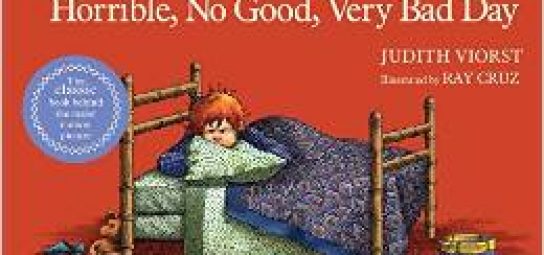SECOND READING: READING THE TEXT – Alexander and the Terrible, Horrible, No Good, Very Bad Day
A you read the text, you will notice that some of Judith Viorst’s sentences are very long. Read them as she has them written. Only pause when you come to a comma (a short pause) or a period (a longer pause). Ms. Viorst’s purpose was to make the text sound as a child would say it. For instance on page 1, Alexander doesn’t stop until he has finished his long statement. The effect is to make the terrible, horrible, no good, very bad events that happen to him really stand out.
Pages 2 – 3:
Read the sentence without pause.
~Why does Alexander want to move to Australia? (If the child has no prior knowledge of Australia, share that it is on the other side of the world. Very, very, very, very far away!)
Pages 4-5:
After reading the pages, discuss:
~On page 4, car pool (a small group of people sharing a ride in the same car)
~On page 4, scrunched and smushed (crowded together very tightly, not enough room for everyone to fit comfortably)
~On page 4, carsick(having an upset tummy from riding in the car)
~How would you feel if you were scrunched and smushed in the backseat of the car?
Pages 6 – 11:
While Alexander is at school:
~On page 6, discuss invisible (impossible to see, not visible). Why wouldn’t Mrs. Dickens like Alexander’s invisible castle?
~On page 9, discuss tack. (a short, sharp pointed nail)
~What does Alexander say to Paul? Why? Have you ever had a similar situation with your best friends when you felt left out?
~predict (make known in advance, especially on the basis of special knowledge). Can you predict if Philip will share one of his cupcakes with Alexander? (No, because nothing good is happening to him today.)
Pages 12 – 21:
After school, let’s see what happens to Alexander.
~On page 13, Discuss cavity (a soft, decayed part of a tooth). Is having a cavity a terrible, horrible, no good, very bad thing?
~On page 14, crybaby (a complainer who cries easily)
Is Alexander a crybaby? Does he have a good reason to complain and cry?
~Why didn’t anyone in his family answer him when he told them about his terrible, horrible, no good, very bad day?
~On page 19, sneakers (shoes with rubber soles; tennis shoes) Use the clues in the illustration. (in a shoe store to buy sneakers) What is another word that names the same type of shoe as sneakers?
~On page 19, Alexander says he isn’t going to wear his new shoes. Is there another way that he could solve his problem?
~On page 20, discuss Alexander’s day. Did Alexander do anything to cause the problems at his dad’s office?
Page 22 – 27:
At home,
~are the things that happen to Alexander terrible, horrible, no good, very bad things?
~how could he turn some of the things that he thinks are terrible into things that are ok with him?
~his mom says some days are terrible, horrible, no good, very bad days. Is she right?
Page 28:
Are there terrible, horrible, no good, very bad days in Australia?


No Comments